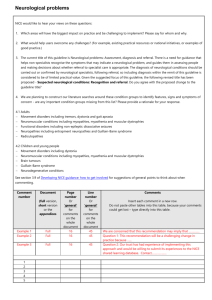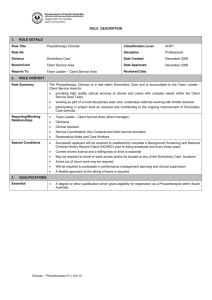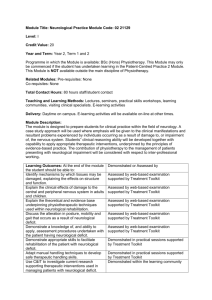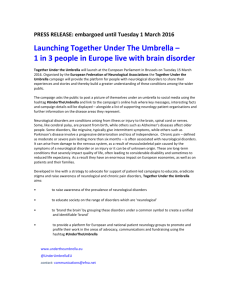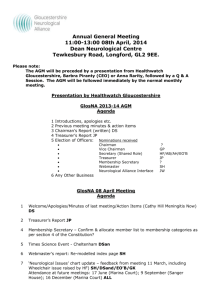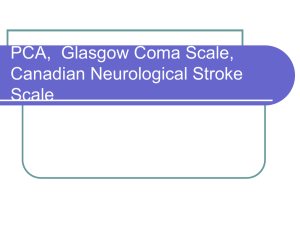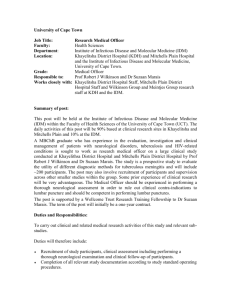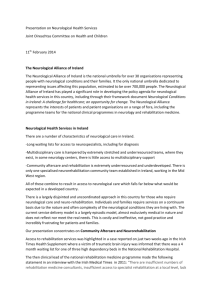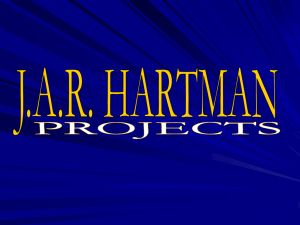Improving the skills of domiciliary care providers
advertisement
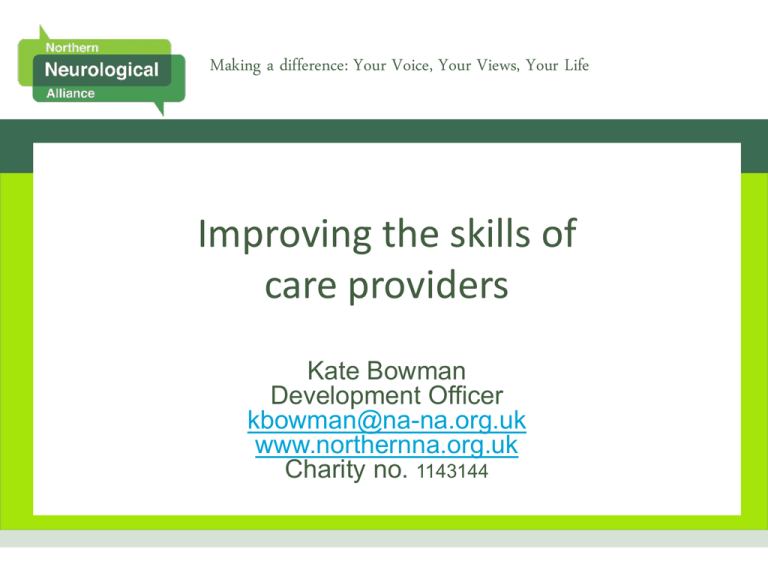
Making a difference: Your Voice, Your Views, Your Life care providers Improving the skills of KATE BOWMAN DEVELOPMENT OFFICER care providers KBOWMAN@NA-NA.ORG.UK WWW.NORTHERNNA.ORG.UK Kate Bowman Development Officer kbowman@na-na.org.uk www.northernna.org.uk Charity no. 1143144 Northern Neurological Alliance The Northern Neurological Alliance (NNA) is a regional charity which supports people with neurological conditions to take control of their condition and make informed choices about their care so that they can live well. Our domiciliary care study Professionals in the health service identified the need NNA gathered further evidence from the local authority, CCGs and members of Northern Neurological Voices NNA sought funding from two sources Aim of the study The aim of this project is to identify the core competencies required for domiciliary support workers, to maximise independence and quality of life for their clients with neurological conditions. Objectives To interview those affected by neurological conditions to saturation point To interview those providing domiciliary care to saturation point Identify gaps in skill/knowledge/attitude Identify standards for a training programme Develop curriculum for a training programme Core training Domiciliary care workers identify their training as: Health and safety Moving and handling Food Hygiene Safeguarding Safe handling of medicines Fire safety Protocols (e.g. can’t get to client on time) Domains identified by clients, families and professional staff Personal care Physical Managing the environment Maintaining Safety Agency/client relationship Maintaining an individual’s state of wellbeing Promoting positive behaviour Organisational Managing sleep Personal care needs identified Washing Drying Toileting Dressing Picking up and passing items Writing Shopping Eating Health and hygiene Night time care Personal care washing, dressing, transfer safely I have personal care; eg washing, combing my hair. I have a wet room and a white chair in there. They move me from the hoist to the chair. Hoist to the shower. I’d like male carers. CLIENT In the morning he has a call at 8am to wash and dress him. We have a wet room with a toilet. It washes and dries his bottom and that’s great as he can get a sore bottom. They put on E45 because he has suffered from leg ulcers and bed sores as he is immobile a lot of the time. I’ve met some very good carers but they’re not given the training or the wage to provide proper care – they’re trained to clean and dress someone as quickly as possible. PARTNER PROFESSIONAL CARER SPECIFIC NEEDS CORE SKILLS SPECIFIC SKILLS washing handling the body, the head and applying pressure appropriately drying turning the body, the head, applying pressure, checking for pressure sores, dry patches dignity and communication toileting hoisting, handling, recognising different physical needs e.g. weight bearing; cleaning/drying dressing moving and handling e.g. risk of falls, slipping Moving and handling Parkinson’s disease Spinal injury Slowness of movement Tetraplegic; legs and arms affected Rigidity Loss of muscle control Resting tremor Loss of sensory control Next steps Invite you to contribute now Write the report Draft the standards Harness the skills of an expert group Develop the core and specific skills of the training programme Seek funding Questions for you How do our findings fit with your experience? What would a standard look like to you? How would you know if you were meeting it? How do our findings fit with your experience? “Domains should be in care plans and aligned with preferred priorities” “I agree that there is a lack of practical training - it's no use just sitting in front of a DVD” “Domains are those that we face as both a domiciliary and residential provider” What would a standard look like to you? “Documents that demonstrate that needs have been identified and then met” “Something that aligns with CQC standards and NVQ levels of training” “Focus on needs and well being of the client - their independence, respect and dignity” How would you know if you were meeting it? “360 degree feedback, including team members, staff and manager as well as client/family” “On the job observations and constructive feedback with training plans in place” “Evidence of improvement against issues that arise with clients”
![Domiciliary Care leaflet editted_new.doc[...]](http://s3.studylib.net/store/data/007119587_1-e85760c65789a5d1ecb4c83918ba0905-300x300.png)

